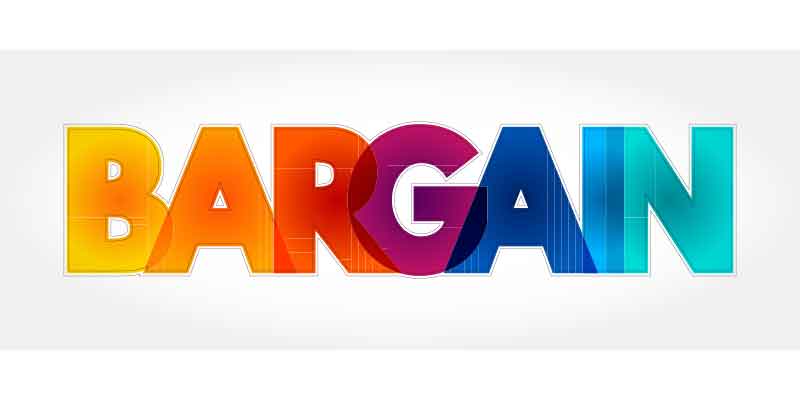Everybody loves a deal. Some people crave the savings, while others enjoy the thrill of the chase and the excitement it offers. But, be forewarned. When you seek the lowest cost, haggle the price down, or choose secondhand purchases, your discounted dream can swiftly turn into a full-priced nightmare. You think you’re getting a deal…but are you?
If price is your sole purchase criterion, you may believe that cheaper is better. But depending on the way that you secure it, it can either be a hidden gem or just fool’s gold.
Is the Deal for Real?
Everyone loves a bargain. Yet, its allure can swiftly transform into a potential pitfall.
On the face of it:
Appearances can be deceiving. Similar appearance doesn’t guarantee similar performance. Ask yourself, is this the steal of the century or the con of the decade?
Strong-arming people can be costly. Pressuring people to reduce their price or complete a task in an impossible time frame can leave folks with a bad taste in their mouth.
Consider the potential compromise on quality. While opting for the lowest bid may seem enticing, it could lead to compromising the quality of the outcome.
Time is precious. Ask yourself how much time and effort it took to secure the deal. If time is money, why don’t people think twice before investing it?
Secondhand may mean second-rate. When you buy something used, make sure it comes with a reliable warranty to avoid potential costs in the future. As Franklin P. Jones, the writer and humorist, said, “A bargain is something you can’t use at a price you can’t resist.”
Haggling can be off-putting. When you negotiate a lower price, the seller’s head may say “yes,” but their heart may say “no.” Ask yourself, will your “win/lose” approach kill their initiative to go the extra mile for you?
Distress sales may lead to regret. Purchasing something in a distress sale may seem like a bargain, but it can leave you unfulfilled, knowing that you exploited the situation.
The deal may be deceptive. Are you the victim of a bait and switch? As the saying goes, “If something looks too good to be true, it probably is.”
Do-it-yourself may cost you. Tackling work yourself, rather than hiring a professional — such as a financial planner — may seem cheaper, but the true extent of what you might be forfeiting could go unnoticed.
The bill will come due. Choosing “buy now, pay later” may appear tempting, but be cautious —you might end up accumulating more debt than you can handle.
Here’s the Deal
There is a clear disparity between cost and worth. While the price represents the financial investment you’re making, it may not always reflect the true worth of the outlay. Therefore, it is essential to look beyond the immediate cost and consider the long-term benefits and satisfaction that you’ll receive from a product or service. As such, consider quality, utility, and value, over mere affordability alone. In the world of deals, it’s not just about picking the low-hanging fruit; it’s about making sure it’s ripe, unblemished, and worth the reach. As Warren Buffet said, “Price is what you pay. Value is what you get.” Is it really a deal?
Check out Frank’s new book, BECOME: Unleash the Power of Moral Character and Be Proud of the Life You Choose
What Are Your Thoughts?
Please leave a comment and tell us what you think or share it with someone who can benefit from the information.
Additional Reading:
Are You Cheap or Frugal?
16 Priceless Strategies for Being Frugal
Live Within Your Means — Or Else!
Invisible Costs Can Cost You a Lot
Prosperity Isn’t About Money
Sometimes It’s Good Business to Turn Away Business
If you like this article, subscribe to our blog so that you don’t miss a single post. Get future posts by RSS feed, email or Facebook. It’s FREE.
Follow me:
Facebook
LinkedIn
X (Formerly Twitter)
Pinterest and
Instagram






Leave a Comment